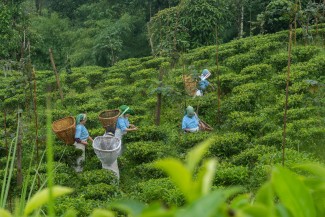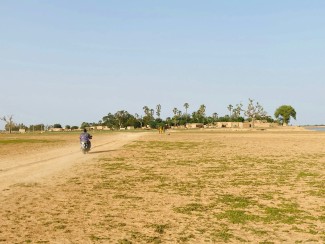To get international buyers, Malawi businesses tackling marketing and certifications
The Bwanje Valley Rice Cooperative has 2,067 members and was established in 2004 in Dedza, Malawi. Sourcing rice from small farmers in the area that are also co-op members, their Kilombero Rice is sold in a range of local shops.
But the cooperative of 1,078 women and 979 men had an issue related to packaging and labelling.
According to Bwanje Valley Rice Cooperative Vice Chair Fidelis Sauka, before they enrolled in a training on best practices for packaging, the co-op had been using plain packets for their rice, without any labelling. On store shelves, this meant a bland-looking product.
“We didn’t have the expertise in how we could package our rice to be able to compete in the market. Our rice was packed in plain packets that were not branded. This affected the competitiveness of our product and we lost out in some markets because of this,” Sauka said.
He added, “Now after attending a training on packaging and labelling we have tremendously improved our packaging. We even received good feedback when we participated in the 2018 Malawi International Trade Fair in Blantyre,” Sauka said.
The Malawi Investment and Trade Centre (MITC) conducted the training on packaging, grading and post-harvest handling, focusing on building up the ability of exporters, producers, food manufacturers and aggregators and particularly those working with grains, pulses and agro-processed products. The ultimate goal is to improve the competitiveness of Malawi’s products in regional and international markets, work that is supported by the Enhanced Integrated Framework (EIF).
The training highlighted the importance of packaging, making producers aware that it is fundamental and something they need to consider. In addition, the different types of agricultural packaging available for different products, determining what kind of packaging to use, and proper storage of agricultural commodities was covered.
Cecilia Sosteni weighs rice before packaging at the Bwanje Valley Rice Cooperative's processing facility in Malawi.
MITC holds at least four of these types of seminars each year, targeting existing and potential Malawi exporters so as to further their progress in international trade.
The Bwanje Valley Rice Cooperative’s fresh packaging has been approved by the Malawi Bureau of Standards, and they will be receiving certification from them as well. That certification offers assurance to consumers that the product is fit for consumption, and that it has passed the quality standards as required by the bureau.
“We are excited that the Malawi Bureau of Standards has been to our factory and has done assessments on our rice and soon we will be given a certification because we have passed all the requirements,” Sauka said.
Aside from improving their business, the co-op is making an impact in the surrounding community by employing support staff to help mill and grade rice.
At their processing facility, they have hired two men and three women as graders.
Twenty-year-old Cecilia Sosteni says her new profession has helped her and her family.
“I come from a single parent home. My father died some years back. My mother is the one who raised me together with my five siblings. She sells tomatoes to provide for the home. But now since I got a job at the cooperative, I am now the bread winner in my family,” Sosteni said.
“Together with my mom’s earnings we are managing to provide basic necessities for the home. And my siblings are able to continue with their education," she added.
Sosteni said she is optimistic that once the cooperative identifies stable markets for their rice, her income will rise.
“I am hopeful that once we manage to find markets, especially international ones, we will earn more than what we are getting now,” she said.
The production capacity for Bwanje Valley is demand driven, with a current capacity of six tons of rice per week, but with the potential for 20 tons per week. In 2018, they produced 4,000 metric tons of Kilombero Rice, which is packaged in packets of 1 kg, 2 kg, 5 kg and 10 kg.
The Bwanje Valley Rice Cooperative is not currently exporting, but has plans to enter into international markets now with their improved packaging. They are working with MITC to identify markets for their rice, with potential in the UK, South Africa, Zimbabwe and Mozambique, among others.
Clement Kumbemba, Chief Executive Officer for MITC, said his institution is striving to get Malawian products to markets.
“We are working very hard to ensure that our products from Malawi have some shelf space in regional and international markets. But, for us to realize this goal we have to firstly work with the producers here to determine what kind of support they need for them to make it in international trade. We have some tailored capacity building programs to equip potential exporters like the Bwanje Valley Rice Cooperative for the best export marketing, like the importance of having well packaged and well labelled products with product descriptions and ingredient information," he said.
If you would like to reuse any material published here, please let us know by sending an email to EIF Communications: eifcommunications@wto.org.




